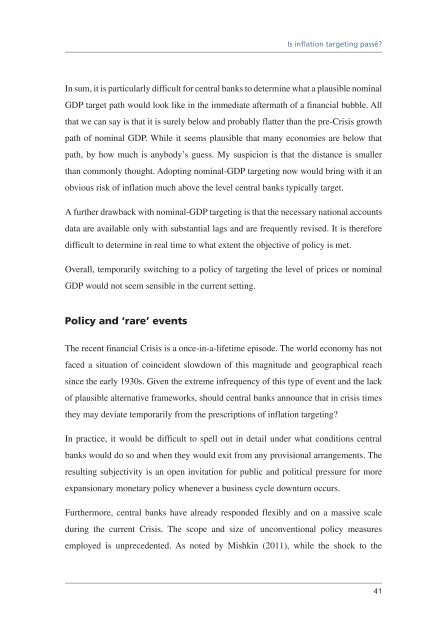Is inflation targeting dead? Central Banking After the Crisis - Vox
Is inflation targeting dead? Central Banking After the Crisis - Vox
Is inflation targeting dead? Central Banking After the Crisis - Vox
Create successful ePaper yourself
Turn your PDF publications into a flip-book with our unique Google optimized e-Paper software.
<strong>Is</strong> <strong>inflation</strong> <strong>targeting</strong> passé?In sum, it is particularly difficult for central banks to determine what a plausible nominalGDP target path would look like in <strong>the</strong> immediate aftermath of a financial bubble. Allthat we can say is that it is surely below and probably flatter than <strong>the</strong> pre-<strong>Crisis</strong> growthpath of nominal GDP. While it seems plausible that many economies are below thatpath, by how much is anybody’s guess. My suspicion is that <strong>the</strong> distance is smallerthan commonly thought. Adopting nominal-GDP <strong>targeting</strong> now would bring with it anobvious risk of <strong>inflation</strong> much above <strong>the</strong> level central banks typically target.A fur<strong>the</strong>r drawback with nominal-GDP <strong>targeting</strong> is that <strong>the</strong> necessary national accountsdata are available only with substantial lags and are frequently revised. It is <strong>the</strong>reforedifficult to determine in real time to what extent <strong>the</strong> objective of policy is met.Overall, temporarily switching to a policy of <strong>targeting</strong> <strong>the</strong> level of prices or nominalGDP would not seem sensible in <strong>the</strong> current setting.Policy and ‘rare’ eventsThe recent financial <strong>Crisis</strong> is a once-in-a-lifetime episode. The world economy has notfaced a situation of coincident slowdown of this magnitude and geographical reachsince <strong>the</strong> early 1930s. Given <strong>the</strong> extreme infrequency of this type of event and <strong>the</strong> lackof plausible alternative frameworks, should central banks announce that in crisis times<strong>the</strong>y may deviate temporarily from <strong>the</strong> prescriptions of <strong>inflation</strong> <strong>targeting</strong>?In practice, it would be difficult to spell out in detail under what conditions centralbanks would do so and when <strong>the</strong>y would exit from any provisional arrangements. Theresulting subjectivity is an open invitation for public and political pressure for moreexpansionary monetary policy whenever a business cycle downturn occurs.Fur<strong>the</strong>rmore, central banks have already responded flexibly and on a massive scaleduring <strong>the</strong> current <strong>Crisis</strong>. The scope and size of unconventional policy measuresemployed is unprecedented. As noted by Mishkin (2011), while <strong>the</strong> shock to <strong>the</strong>41














